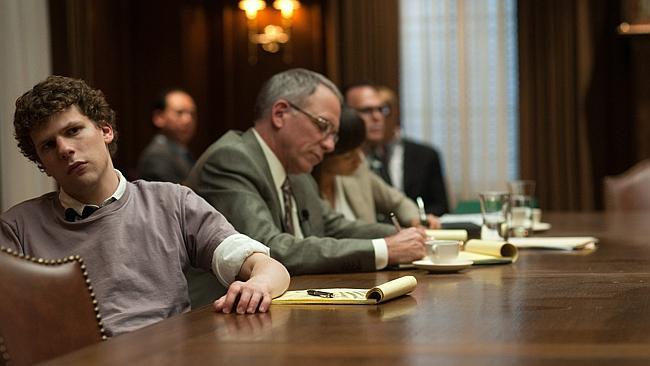Confessions of a serial entrepreneur
IT LOOKS easy making billions, but simple mistakes can kill your idea. Here one entrepreneur tells us what he learned so you don’t have to make the same mistakes.

Business Technology
Don't miss out on the headlines from Business Technology. Followed categories will be added to My News.
I’VE raised venture capital. I’ve sold companies. I’ve scaled products to millions of users. And I’ve made every mistake in the book.
The truth is, entrepreneurship is nothing like The Social Network. It’s fierce out there. It’s a game of making as many right decisions and as few mistakes as possible, Ask Men reports.
So here are some legendary mistakes I’ve made, so you don’t have to make them yourself.
Forgetting about building your network
Your network is your net worth. Any way you can build your network of journalists, industry folks or influencers is ammo in your back pocket. It’s almost as good as cash. You should be spending at least 15 per cent of your time scouring for the right people to know and hustling to connect with them. The truth is, the smartest people don’t always win in business, but the ones who are most connected typically do.
I’ve met acquirers at dinner parties and investors at conferences. One time, I snuck into a party being held for a really notable Silicon Valley entrepreneur. There, I met and became friends with a well-known venture capitalist. The key is the follow-up and nurturing those relationships to become authentic friendships. People do business with people — most often, with their friends.

Picking a small market
Pick a big market — because it gives you room to “pivot” ideas. A friend of mine raised $500,000 to build a Scientologist app. Think how limited the market is. What if it doesn’t resonate with that audience? What if it isn’t a huge business? There is no way for him to pivot into something else.
One of my favourite pivot examples is Instagram, which started off as a Burbn — a way to “check-in” to locations via a mobile web browser. The most used feature of Burbn was uploading photos to these locations and the check-in quickly fell to the wayside. Because the founders weren’t pigeonholed into a small space, they were able to launch Instagram as a stand-alone photo-sharing app. It took off, and the rest is history. My friend’s Scientologist app would be unlikely pivot into something related, because the market is just too damn small.

Settling on hiring early employees
Your first employees need to be the most passionate. I’ve hired brilliant employees who lacked the passion for the space I was tackling. If you start a tea company, your employees better live and breathe tea. They will set the tone and culture — their dedication will make or break the company. You can’t make a successful business by yourself. Take your time when hiring your first employees.
I once hired an “all-star” engineer. He had the whole package. Studied computer science at a well-known university and was a lead engineer for a top start-up. The day I hired him, I got emails from friends congratulating me on the hire. But I quickly realised he wasn’t a fit in our company. On paper, he was amazing, but he didn’t gel with other teammates and lacked the passion in our space. If you’re going to win in Startup Land, passion is your competitive advantage.

Cheaping out on professional advice
Before you even incorporate, find yourself a good lawyer and accountant. And you better make sure you’re confident in their skills. Would you trust them with your life? Because that’s basically what you are doing. Your lawyer is your best friend when you’re selling your company — otherwise, you may find yourself getting sued for copyright infringement.
I’ve had professionals helping me that were friends of friends and not the best fit for the job. I settled with them because I got a preferred rate. It was shortsighted and cost me thousands of dollars in the medium- and long-term. A friend of mine — Dario Meli, who co-founded HootSuite and is now the founder/CEO of Quietly — reminded me of a bang-on quote on the subject: “If you think it’s expensive to hire a professional, wait until you hire an amateur”.

Fundraising at the wrong time
The key to fundraising from investors is going to them at the right time with the right story. Growth is the key theme when you’re trying to raise money. No one wants to invest in something that’s stagnating. No one cares. Investors want to jump onto a rocket ship and want to be investing right at lift-off. Until you’ve manufactured some growth, do not have investors’ meetings to pitch your business. Wait until the time is just right, because you can only make a good first impression once.
I’ve known founders who’ve tried to raise seed capital pre-growth — this is difficult unless you have really sturdy relationships with potential investors. It’s just setting yourself up for failure. Spend the extra time (and money) and show some growth before blowing a first impression with an investor.

Mistakes can make you a better entrepreneur. The only problem is, mistakes cost money and time and are huge headaches. I hope these lessons will prevent you from making some key mistakes — and help guide you to some key successes.
Greg Isenberg is a mobile product guy, marketer and investor. He’s helped build marketing and social media campaigns for FedEx, Microsoft, TechCrunch and Wordpress. He also helped develop the world’s most popular stock market simulator, Wall Street Survivor. He is currently the CEO of 5by (acquired in 2013 by StumbleUpon) and Venture Partner at Good People Ventures, an early-stage angel fund.

